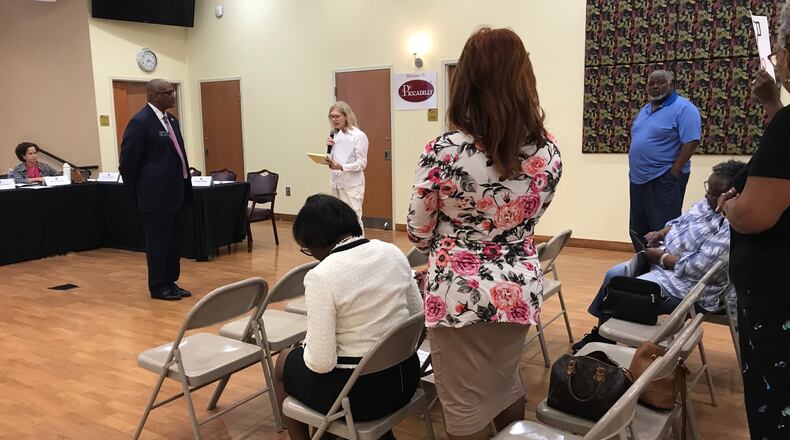Members of the DeKalb County Legislative Delegation said the ethics reform bill they approved earlier this year was the result of weeks of collaboration, not a watering down of previous reforms as critics describe it.
Lawmakers on Monday held the first of four town hall meetings to discuss the contents of the ethics bill, which requires voters' approval in order to become law. That referendum will be on the ballot countywide in November, and delegation members say misinformation is clouding the debate.
“It’s just not true to say that this bill is weak on ethics,” Rep. Renitta Shannon, D-Decatur, said. “And we would not have voted for it if it was weak on ethics.”
During the first half of Monday evening’s meeting, held at the Lou Walker Senior Center in Stonecrest, Georgia Sen. Emanuel Jones explained the bill’s key provisions.
Jones, D-Decatur, served as the primary sponsor of the legislation as it went through dramatic revisions during the 2019 session. Initially, Senate Bill 7 only changed the way members of the DeKalb Ethics Board are appointed in order to comply with a Georgia Supreme Court ruling.
But as it bounced back and forth between the House and Senate, the bill was expanded. The final version requires DeKalb County employees who want to file complaints to go through Human Resources first, revises the definition of which employees are subject to Ethics Board oversight and replaces the position of ethics officer with an ethics administrator who has fewer duties.
Read more | Kemp allows DeKalb ethics bill to become law without his signature
Also | DeKalb lawmakers to discuss ethics reform at a series of town halls
The audience included many people who came to voice opposition to the proposal. Among them was Mary Hinkel, who chairs a group behind a campaign to have the referendum voted down this fall.
The organization, DeKalb Citizens Advocacy Council, argues that Senate Bill 7 reduces the independence of the ethics board, creates roadblocks for those with ethics complaints and reduces the professional standards for the county's ethics administrator. They consider it a rollback of reforms approved by a 2015 referendum.
“With all due respect to our DeKalb legislators, the legislation to revise the Ethics Act is disrespectful of the 92% of DeKalb voters who voted in 2015 to create a strong, effective and independent ethics board and staff after experiencing corruption ranging from Commissioner Elaine Boyer’s misuse of county funds to the illegal activities of Commissioner Stan Watson,” Hinkel said during public comment. “The current legislation, deliberated on without great public input or transparency, may represent compromise among the legislators, but these compromises actually gut the Ethics Act and take us backwards.”
Read more | Does official’s arrest mark the end of corruption in DeKalb County?
Also | $9,000 fine for former DeKalb commissioner Watson warning to others
Most of the other speakers from the audience also were critics of the bill.
Jones said Monday that the legislation wasn’t perfect but the best version that could be reached once all delegation members weighed in.
“It is an accumulation of ideas from everyone that sits up here,” he said, motioning to his colleagues.
Rep. Doreen Carter said much of that opposition is based on misinformation about its contents. She said DeKalb voters should trust that their elected officials had good intentions when drafting the ethics bill.
“I wish you had a little more faith in what we’ve done,” Carter, D-Lithonia, said. “No one twisted our arm; we didn’t compromise.”
The remaining town halls are:
- Oct. 1, 6:30–8 p.m., Tucker-Reid H. Cofer Library, 5234 LaVista Road, Tucker;
- Oct. 15, 6:30–8 p.m., Manuel J. Maloof Auditorium, 1300 Commerce Drive, Decatur;
- Oct. 21, 6:30–8 p.m., Brookhaven City Hall, 4362 Peachtree Road NE, Brookhaven.
About the Author
Keep Reading
The Latest
Featured



